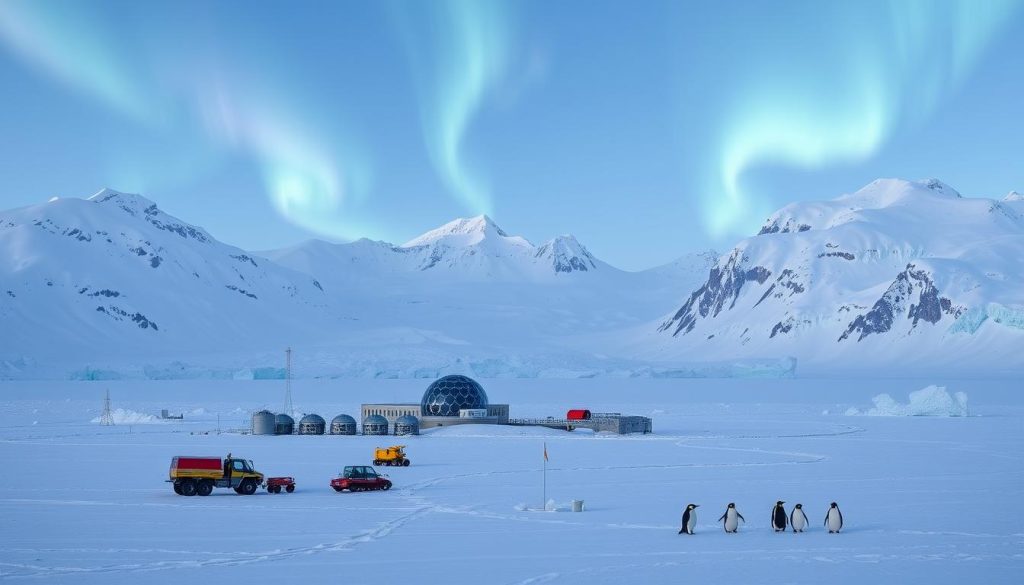Starting a research station in Antarctica is challenging yet rewarding. It needs careful planning due to the extreme conditions. We’ll cover vital tips for setting up your station, focusing on legal and environmental rules.
Key points include strong security and the benefit of working across different study areas. These aspects help your station work well and boost science in a remote area.
Understanding the Antarctic Environment
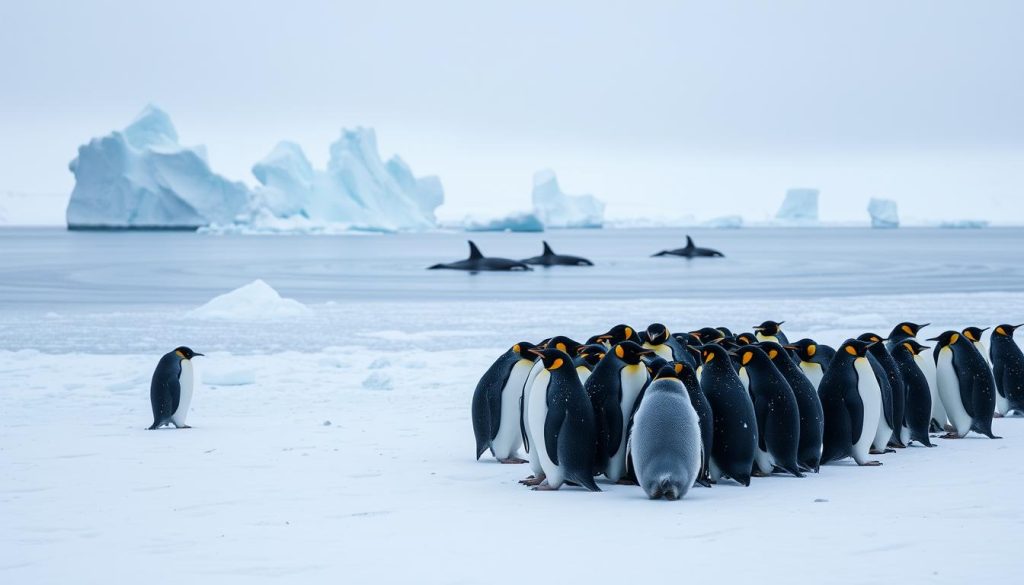
The Antarctic environment is unlike any other, filled with unique challenges for researchers. With its extreme cold and unpredictable weather, knowing how to handle these elements is key. Scientists and their teams must learn to adapt to survive and conduct their research effectively.
Climate Challenges and Adaptations
The Antarctic climate is harsh, with long nights and strong winds. Research bases use special equipment and provide thorough training to cope. They also plan for emergencies to keep everyone safe.
- Utilising specially designed equipment that can withstand low temperatures.
- Implementing robust training for personnel to prepare for rapidly changing weather conditions.
- Establishing contingency plans for logistics and emergency evacuations.
Making these adaptations is crucial to reduce the research’s environmental impact.
Wildlife Considerations
Research in Antarctica affects its wildlife, so it’s important to act carefully. Researchers must work at certain times to protect native species. They also follow rules to avoid harming animals’ homes.
- Conducting research during specified seasons to avoid key breeding times of native species.
- Incorporating guidelines that respect the habitats of animals like seals and penguins.
- Regularly assessing how research activities may influence local ecosystems.
Being mindful of Antarctica’s wildlife ensures research helps rather than harms. This careful approach aids in preserving the continent’s delicate ecosystems.
Regulatory Requirements for Operating in Antarctica
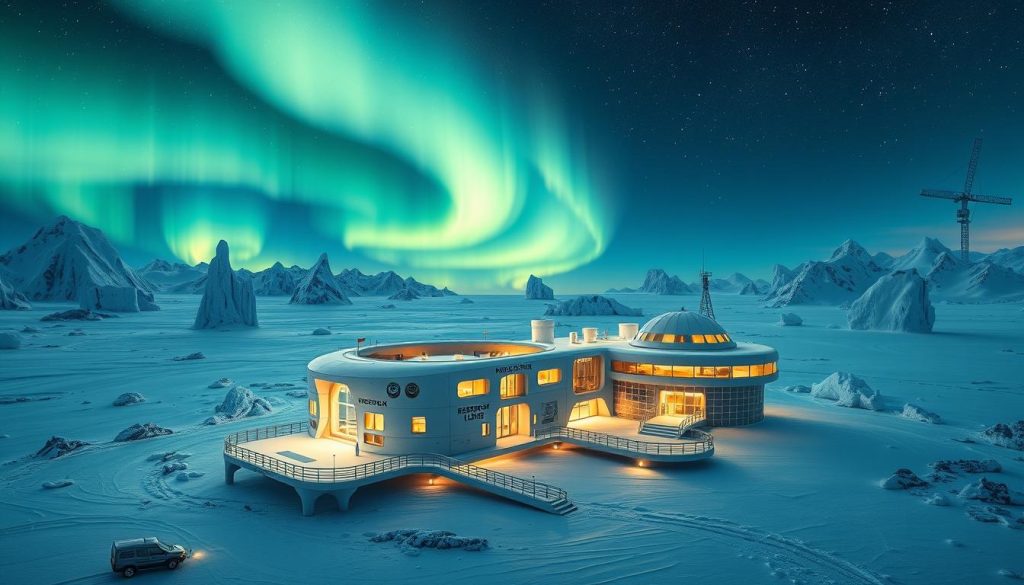
The Antarctic regulatory framework is a complex system designed to ensure the preservation of the unique environment while promoting scientific research. This framework is primarily formed by international agreements that set the standards for activities conducted on the continent. Understanding these legal requirements is essential for any research endeavour in Antarctica.
International Treaties and Agreements
At the heart of the Antarctic regulatory framework is the Antarctic Treaty System, created in 1961. This treaty fosters international collaboration in scientific research and emphasizes environmental protection. The treaty is supported by various protocols, including the Protocol on Environmental Protection. These agreements reflect the commitment of participating countries to responsible and sustainable research.
National Policies and Permits
Countries engaged in Antarctic research have their own national policies. Before starting operations, it is crucial to obtain national permits for Antarctic research. These permits are necessary to comply with national and international regulations. They show a country’s dedication to preserving the Antarctic while supporting scientific discoveries. Researchers must carefully follow these legal steps to ensure compliance and uphold ethical research standards.
Funding and Financial Planning
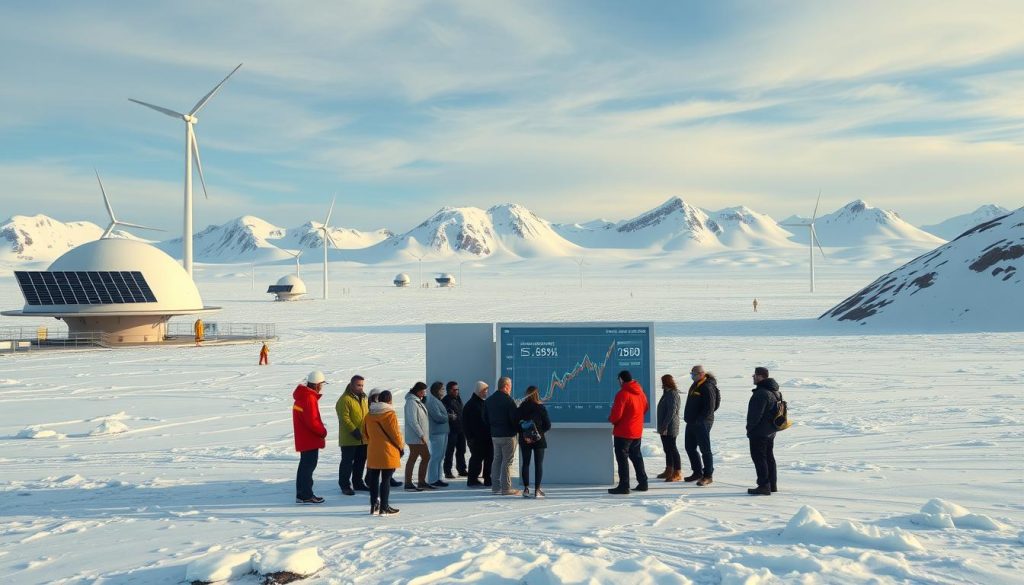
Setting up a research base in Antarctica needs careful money planning and clever ways to find funds. This requires looking into many options to get the money needed for long-term work and research. By getting grants and sponsorship, researchers can keep their projects going. They face the unique Antarctic challenges this way.
Securing Grants and Sponsorship
Getting sponsorship is key to funding Antarctic research. Governments and private groups provide grants for science projects there. Here are important steps researchers should follow:
- Look for organizations that support environmental and scientific projects.
- Create strong proposals that show how the research can make a difference.
- Work with private companies interested in science progress.
- Form long-term partnerships with well-known organizations.
Budgeting for Long-Term Operations
Planning finances for research bases needs detailed budgeting. The high costs of working in such a faraway place mean researchers must focus on:
- Creating a budget that covers all expenses, including staff and research materials.
- Planning for extra costs that might come up.
- Checking the budget regularly to adjust to new financial situations or funds.
- Keeping money matters clear to stay in good standing with sponsors and grant makers.
Site Selection for Your Research Station
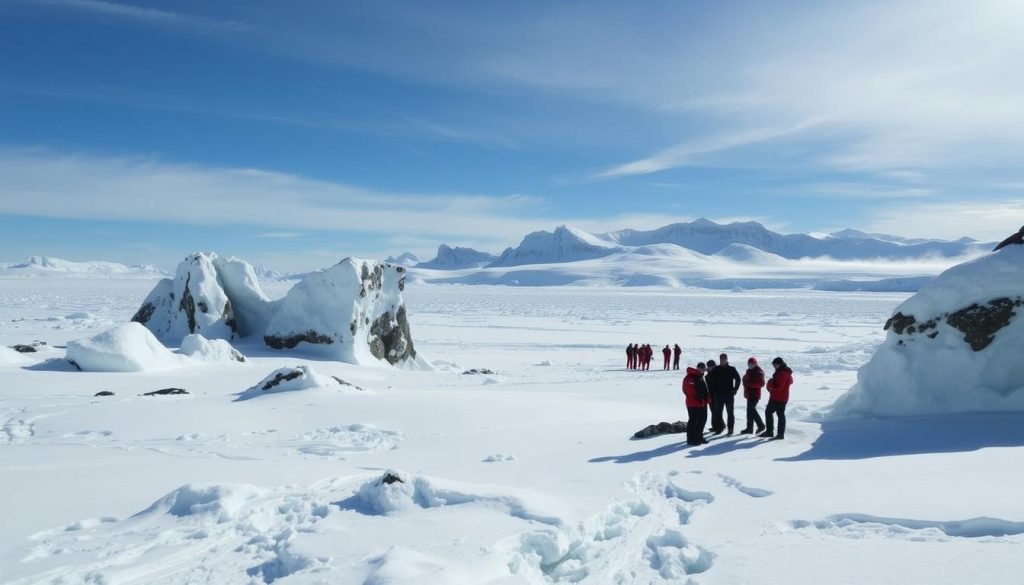
Finding the right spot for your research station in Antarctica is a big task. You have to think about what you want to achieve scientifically. Plus, you need a solid plan for dealing with the challenges of working in a remote area. Let’s talk about what you need to consider to pick the best place.
Logistical Considerations
Planning your logistics well is key to a successful research station. Here’s what to keep in mind:
- It should be close to key research spots to make fieldwork easier.
- If you can use local resources, you won’t need as much stuff brought in.
- You have to check how your work affects the environment to keep things green.
- And think about how you’ll get supplies and handle emergencies.
Accessibility and Transportation
Being able to get there and around is super important. How you plan to move stuff affects where you’ll set up. You should consider:
- Existing ways to get there, like ice roads or planes.
- The chance to make getting there easier as your project grows.
- And don’t forget to think about the weather. It can really change your plans.
Design and Infrastructure of the Research Station
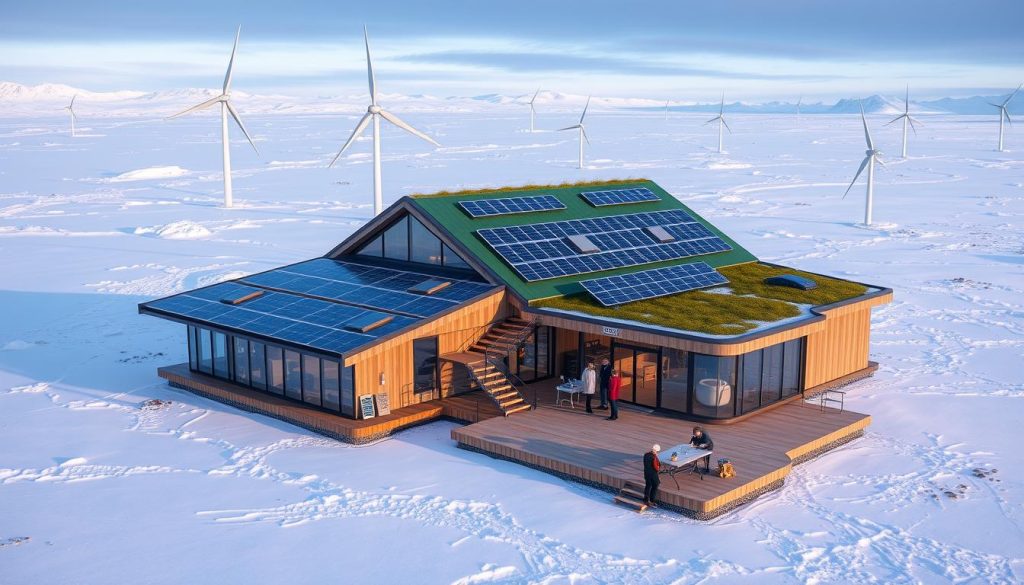
Creating a research station in Antarctica demands careful planning. It must withstand extreme weather and be sustainable. This includes designing for vital research while protecting the delicate Antarctic environment.
Sustainable Construction Materials
Choosing sustainable materials is key for durable, eco-friendly buildings. We use:
- Recycled steel and aluminium for strength.
- Insulated panels to keep warmth in.
- Materials from close by to cut emissions.
By doing this, we build responsibly in Antarctica. It shows our commitment to safeguarding the region’s nature.
Energy Efficiency Measures
Energy-saving steps are crucial for the research station’s sustainability. To save energy, we have:
- Solar panels for green energy.
- Wind turbines that use the air’s power.
- Top-notch insulation to prevent heat loss.
These actions reduce costs and support global energy-saving goals. They make the station a model of green research.
Essential Equipment for Research Stations
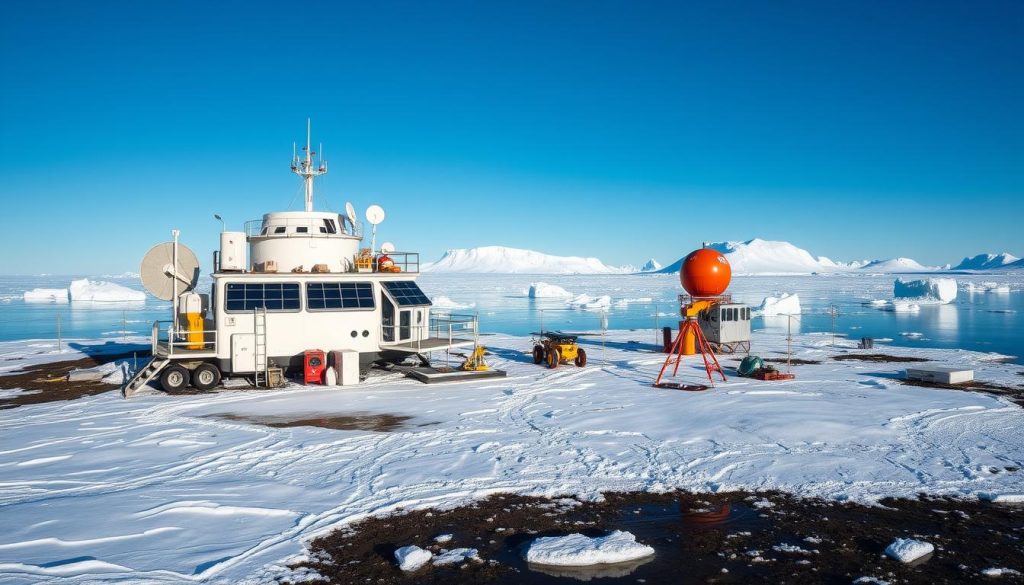
Setting up a research station in Antarctica needs careful planning. Both scientific tools and living conditions for the team matter. High-quality research gear is key for good data collection and study. Knowing what scientific tools and safety gear are needed keeps the station running smoothly and everyone safe.
Scientific Instruments and Technology
Accurate and dependable tools are at the heart of studying Antarctica. Key equipment includes:
- Remote sensing satellites that gather data on ice sheets and snow cover
- Advanced weather stations for monitoring climatic changes
- Data logging devices which track environmental variables over time
- Geophysical survey equipment for exploring the subsurface
- Laboratory equipment for sample analysis, including microscopes and spectrometers
Living Quarters and Safety Gear
Creating cosy and safe living spaces is critical in Antarctica’s tough conditions. Well-designed living areas boost work and happiness. It’s important to think about:
- Insulated structures built to withstand extreme cold and wind
- Modular designs that facilitate easy expansion or modification
- Essential safety gear for Arctic conditions, including thermal clothing and weather-resistant footwear
- First-aid kits and emergency equipment for unforeseen situations
- Reliable heating systems to maintain a safe indoor environment
Tips for Opening a Research Station in Antarctica
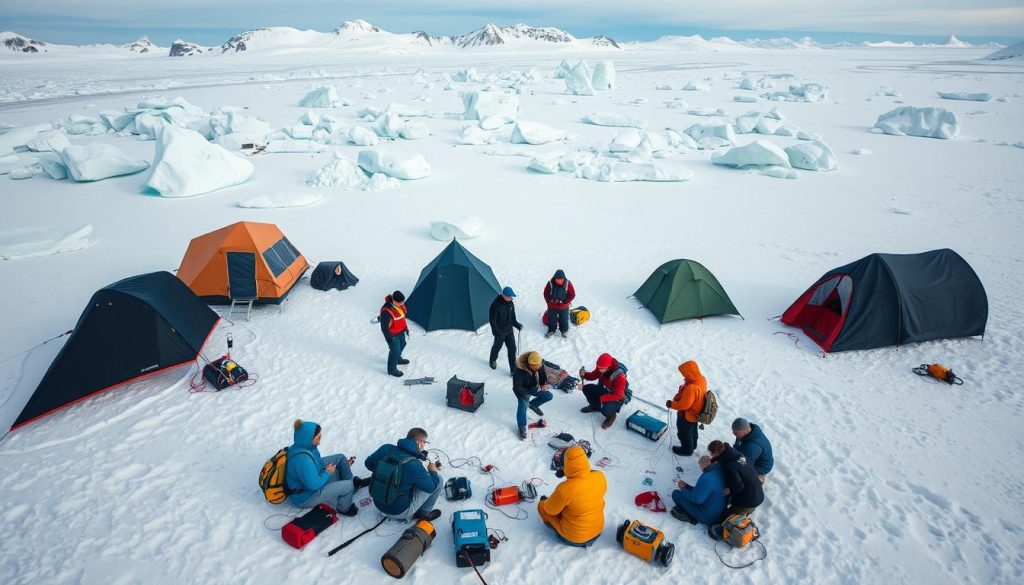
Setting up a research station in Antarctica needs two main things: a skilled team and proper training. It’s key to have a team ready for Antarctica’s unique challenges due to its harsh and remote conditions.
Assembling a Skilled Team
Creating a research team for Antarctica means picking people with different skills. You will need:
- Climate scientists
- Biologists specialised in polar ecosystems
- Logistics and operations managers
- Field technicians for on-site equipment maintenance
- Safety and medical personnel
Each member should help to create a team that’s great at solving problems. This is crucial for the tough work in Antarctic research.
Training and Skill Development
Training is key for dealing with Antarctica’s complex environment. You should:
- Run simulations of real-life Antarctic scenarios.
- Hold workshops to improve research skills for the area.
- Push for training across different fields to make the team more versatile.
Training not only gets the team ready but also builds a learning culture. This is important for success in such a faraway place.
Health and Safety Protocols
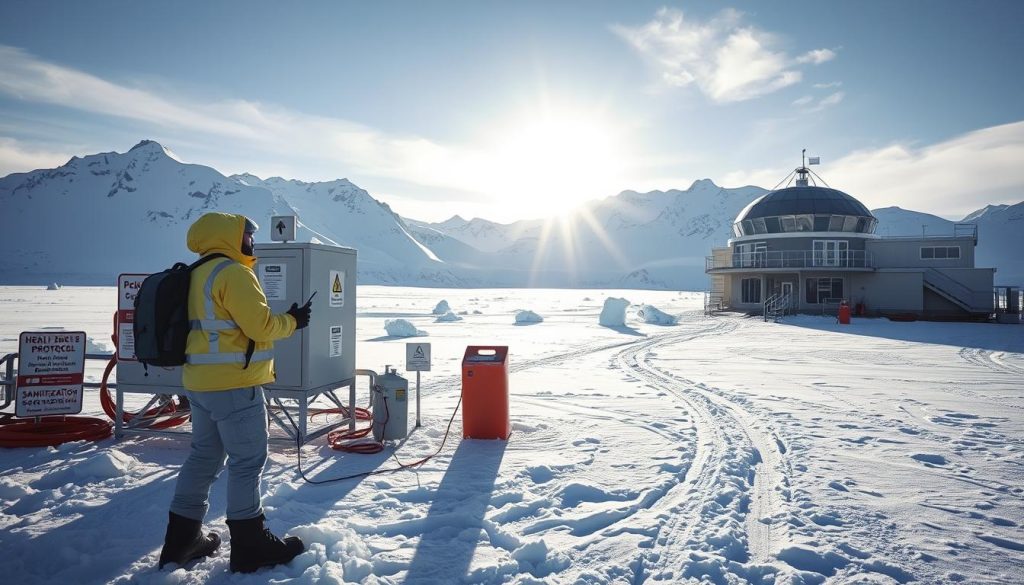
Operating a research station in Antarctica requires strict health and safety rules. This is to protect the team in harsh conditions. Accidents or health concerns highlight the need for strong medical support and emergency plans.
It’s vital to look after both the body and mind. Prolonged isolation can really impact a team member’s psychological well-being.
Medical Facilities and Emergency Plans
Setting up sufficient medical facilities is key. They should have:
- Emergency medical treatment rooms equipped with essential supplies
- Trained medical staff ready for emergencies
- Regular health protocol training sessions for everyone
It’s crucial to have clear emergency strategies. Communication must be quick to reach support teams. There should be a plan for medical evacuation too. This planning lowers the health risks in this far-off place.
Mental Health Strategies for Isolation
Mental health in isolation is very important to think about. Ways to help the team include:
- Regular meetings for emotional support
- Access to mental health pros who understand isolation
- Fun activities to boost socialising and reduce stress
These mental health steps improve well-being and work results. It’s crucial to support the team’s mental health. Especially during the tough periods in a place as unique as an Antarctic research station.
Collaborating with Other Research Entities
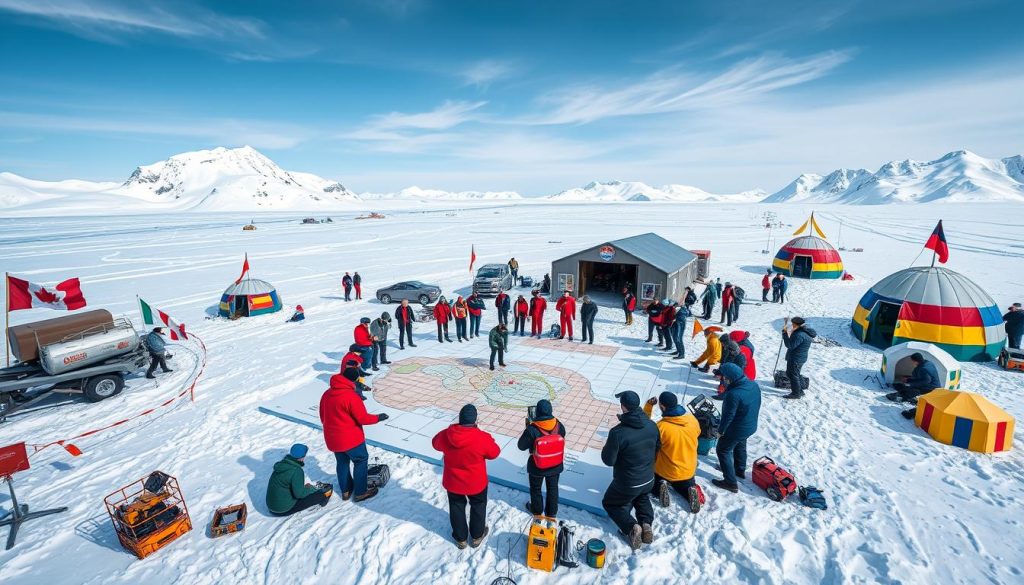
Working together is key in Antarctic research. It helps to advance our knowledge of this special place. By joining forces with academic institutions, researchers can share resources and skills. This makes a strong base for study.
Such teamwork can improve research power and bring new ways to explore. This is crucial for understanding the complex Antarctic ecosystems.
Building Partnerships with Universities
Teamwork with universities boosts research efforts greatly. These places have the latest tech and many experts. Working together, they can:
- Run joint research programmes
- Share lab space
- Use big data sets
This approach lets many experts help with Antarctic research topics.
Networking Opportunities in Antarctic Research
Networking is key for scientists to link up. Events like conferences and workshops are great for meeting others. Here, researchers can:
- Find new team members
- Talk about ways to work and methods
- Look for joint funding
By joining these events, scientists boost teamwork in Antarctic research. This leads to important findings and progress.
Environmental Sustainability Practices
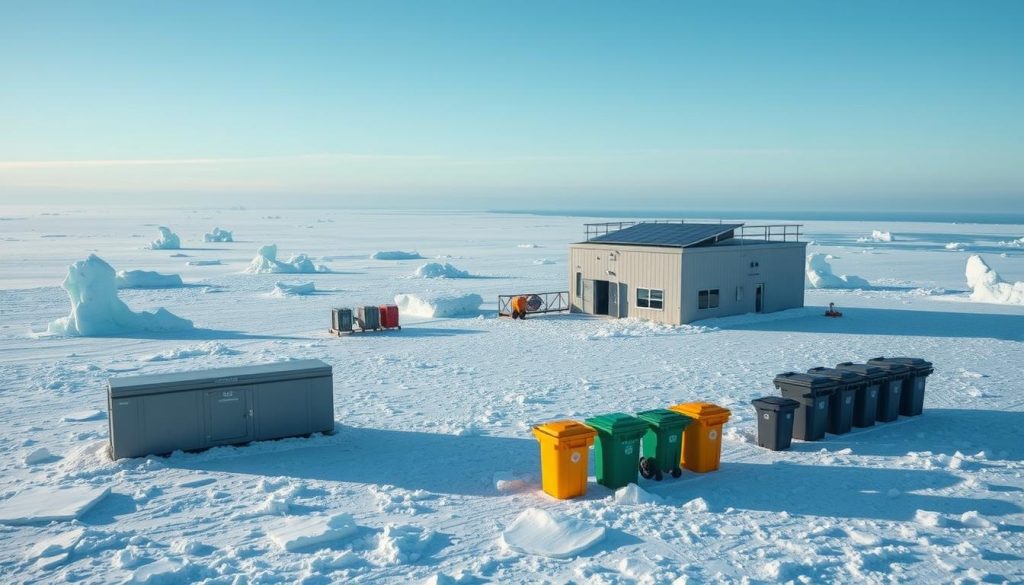
It’s vital to keep research eco-friendly, especially in Antarctica’s delicate environment. We need to use methods that lower our ecological footprint and improve how we handle waste. This helps protect the unique life in this area. There are many ways researchers can do this.
Minimising Ecological Footprint
To cut down on the ecological footprint, research bases should use sustainable techniques. These key steps can help:
- Using power from the sun and wind.
- Bringing in tech that uses less energy for work.
- Offering green ways to move people and gear.
- Spreading the word on being kind to the environment among the team.
Waste Management Strategies
Handling waste well in Antarctica is key to avoid polluting and disturbing habitats. Research stations need strong plans for waste, which include:
- Sorting waste right where it’s made to help recycle and throw away properly.
- Setting up ways to turn organic waste into compost.
- Using tech to clean wastewater before it goes out.
- Checking regularly how waste is made and disposed of.
Communication Systems in Remote Locations
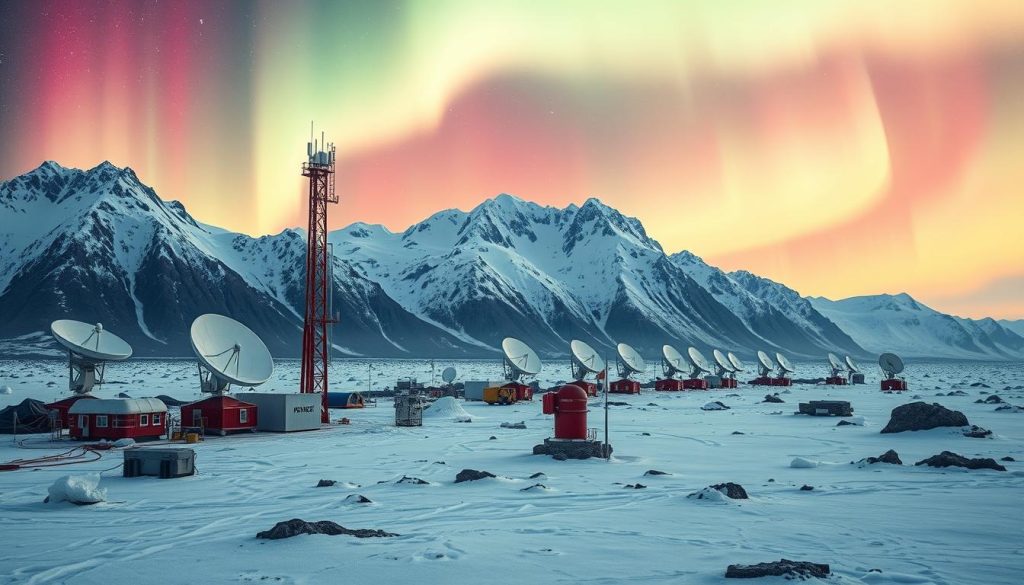
Effective communication is key in Antarctica’s harsh conditions. It is important for staying in touch and supporting research. These systems ensure successful operations and safety for everyone involved.
Satellite Communication Technologies
Satellite tech has become vital in Antarctica for good communication. It helps share data instantly, even from far-off places. The technology has many benefits:
- Fast data transmission through high-throughput satellites is crucial.
- Portable satellite terminals are easy to set up anywhere.
- These systems work well with land networks for clear communication.
Good communication tools improve teamwork and help in emergencies. Using the latest satellite tech is necessary for safety and success in Antarctic research.
Logistical Support and Supply Chains
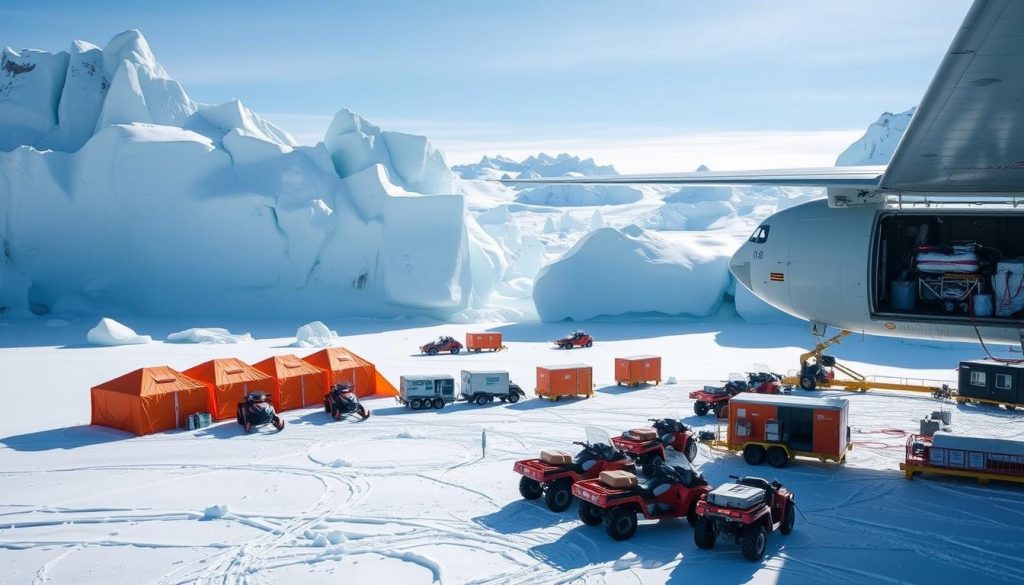
Carrying out operations in Antarctica demands strong logistical support and good supply chain management at research stations. The harsh conditions make it hard but essential to plan well for transporting supplies and staff to distant places. Being meticulous and planning ahead can improve how well we manage logistics in this tough setting.
Transporting Supplies and Personnel
Moving essentials to research bases is full of challenges. The weather is unpredictable and there are few ways to get there. We use different methods to transport goods:
- Aerial transport via helicopters and small aircraft for urgent deliveries.
- Icebreaker ships capable of navigating harsh seas for bulk supplies.
- Surface vehicles adapted for icy terrains, ensuring supplies reach even the most remote locations.
It’s also important to move people safely in Antarctica. We rotate staff to keep them from getting too tired and to keep operations running smoothly. By planning carefully and having backup plans, we can handle unexpected issues better.
Storage Solutions for Extreme Conditions
Storing supplies properly in such harsh conditions is key. We use the following solutions:
- Utilising insulated and temperature-controlled containers to prolong shelf life.
- Designing modular storage units that withstand harsh weather while maximising space efficiency.
- Implementing inventory management systems to track supplies in real-time, reducing waste and ensuring replenishment.
Smart storage is crucial for managing supplies at research stations. With the right planning, we make sure everything needed is available, even in the toughest situations.
Conducting Ethical Research in Antarctica
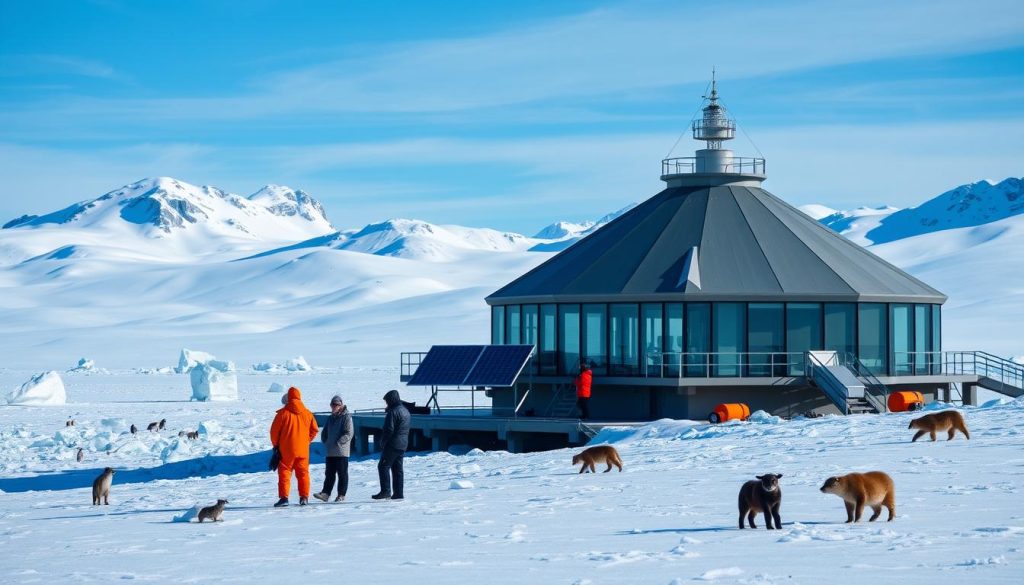
Researching in Antarctica comes with unique challenges and important duties. Scientists must follow ethical practices. These respect the local environment and protect its wildlife. Doing so maintains the quality of research in this delicate area.
Respecting Indigenous Wildlife
Antarctica’s native wildlife is key to its ecosystem. Researchers must make sure their work does not harm animal populations or their homes. To do ethical research in Antarctica, they:
- Look into how their research affects wildlife before starting.
- Use methods that don’t disturb animals too much.
- Work with conservation groups to learn how to protect wildlife.
Promoting Responsible Science
Responsible science is the base of ethical research in Antarctica. Scientists must fully grasp the importance of preserving the environment. They must also follow guidelines. Important steps include:
- Being clear about what they aim to do and how.
- Working together with locals to make sure research helps conservation.
- Checking carefully how their studies impact the ecosystem.
Future Trends in Antarctic Research
The future of Antarctic research looks exciting with big changes ahead. These changes come from new technology and a bigger focus on climate change. We will see new ways to explore science that let us understand Antarctica better. Tools like sensor networks and vehicles controlled from afar will help scientists. They will be able to watch and collect data all the time without a break.
Understanding how climate change affects Antarctica is becoming more urgent. Researchers from different fields will work together more. This includes universities, government bodies, and private groups. Their joint efforts will make Antarctic research advance faster. It will also make the studies more thorough and powerful in finding solutions.
As the situation in Antarctica changes, so does how researchers work there. The trends we see today will guide future studies. Focusing on ways to research that don’t harm the environment will be key. This, along with more awareness and involvement from people worldwide, will keep Antarctic research important. It will stay at the leading edge of discovering new things and caring for our planet.

